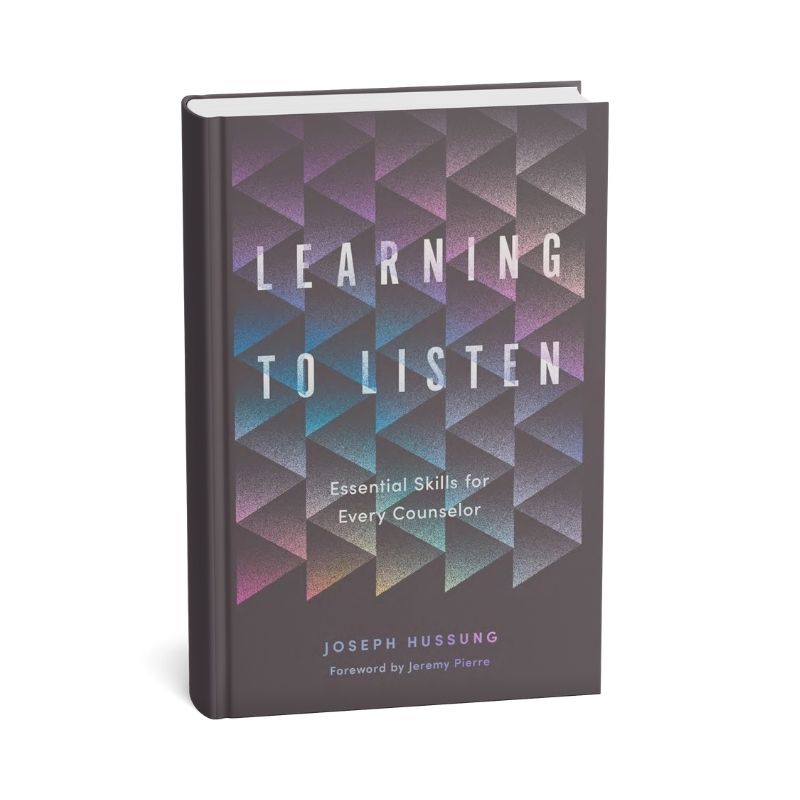Listening is one of the most essential skills in biblical counseling. Without it, real heart change is nearly impossible. Learning to Listen by Joseph Hussung is a must-read for counselors who want to grow in compassionate, Christlike listening. This book goes beyond theory, offering practical steps to help counselors genuinely hear and understand their counselees. Learning to Listen will equip you with essential skills if you want to improve your counseling and make a lasting impact.
Learning to Listen: More Than Just Hearing
Most of us assume we’re good listeners. We nod, make eye contact, and wait our turn to speak—but is that really listening? Learning to Listen dives deep into what true, Christlike listening looks like. It’s not about sitting silently while someone talks or mentally preparing your response before they finish. Instead, it’s about being fully present, drawing out the heart, and responding with wisdom and love.
Hussung reminds us that God Himself is a listening God. He hears our cries, prayers, and even the unspoken burdens of our hearts. As biblical counselors, we’re called to reflect that same attentive, compassionate listening. This book helps you develop that skill, moving beyond surface-level conversations to truly hearing and understanding the struggles of those you counsel.
The Biggest Pitfall Counselors Face
You might think counselors’ biggest mistake is giving bad advice, but it’s not listening well. It’s easy to assume we already know what’s happening before the person in front of us even finishes speaking. We connect their struggle to something we’ve heard before, jump to conclusions, and start formulating our response before they’re done talking. Sound familiar?
Learning to Listen exposes these common counseling pitfalls and offers a better way. Hussung walks through practical skills that help counselors slow down, ask better questions, and resist the urge to jump in too soon. The book doesn’t just tell you to listen—it gives you actionable steps to improve, from refining your posture to recognizing when your biases are getting in the way.
Learning to Listen Transforms Counseling—and Lives
One of the most powerful takeaways from Learning to Listen is that truly listening can change everything. People come to counseling because they need help, but they also need to feel heard. A counselor who listens well creates a space where healing can begin. Hussung emphasizes that listening isn’t just a skill—it’s a ministry.
When counselors learn to listen like Christ, they invite real heart change. Instead of offering quick fixes or rehearsed biblical advice, they help counselees uncover deeper struggles and apply God’s truth in a way that sticks. The book highlights how skilled listening leads to breakthrough moments in counseling conversations.

Learning to Listen, Unique Approach to Biblical Counseling
Listening as a Ministry, Not Just a Skill
Most people think of listening as a passive skill—something you do while waiting for your turn to talk. But Learning to Listen flips that idea on its head, showing that listening isn’t just a technique but a ministry. Hussung argues that biblical counselors who listen well do far more than gather information—they extend Christ’s love through their presence, patience, and attentiveness.
This book challenges you to see listening as an act of service. When someone walks into a counseling session feeling unheard, misunderstood, or burdened, your ability to listen with genuine care can be life-changing. Hussung clarifies that listening isn’t just about preparing the correct response—it’s about creating a space where people feel safe enough to share their struggles. He reminds you that listening with compassion isn’t just kind; it directly reflects God’s heart for His people.
The Three Pillars: Purpose, Posture, and Practice
Many books on counseling focus primarily on what to say, but Learning to Listen structures itself around three key aspects of biblical listening: purpose, posture, and practice. This framework helps counselors go beyond surface-level communication and develop a listening style that is both theologically grounded and practically effective.
- Purpose: Why does listening matter in biblical counseling? Hussung lays the foundation by showing that listening reflects God’s character. He highlights how God Himself is a listener—one who hears the cries of His people, responds with wisdom, and draws near to the brokenhearted. Understanding this gives counselors a new sense of urgency in their listening, knowing they are mirroring God’s care when they truly hear their counselees.
- Posture: Listening isn’t just about technique—it’s about the heart behind it. Hussung emphasizes that counselors must approach listening with humility, patience, and gentleness. A counselor who listens with a prideful or distracted heart isn’t genuinely hearing the person in front of them. This book provides practical ways to develop a Christlike posture in every conversation, helping you listen with the same love and wisdom Jesus demonstrated.
- Practice: The book doesn’t stop at theory—it equips you with fundamental, actionable skills. Hussung dives into the mechanics of listening, showing you how to ask better questions, reflect on what you’ve heard, and avoid common listening pitfalls. He even provides examples of how counselors can navigate difficult conversations without shutting people down or rushing to solutions.
Moving from Surface-Level Listening to Heart-Level Engagement
One of the biggest takeaways from Learning to Listen is the difference between hearing someone’s words and truly understanding their heart. Hussung warns against “surface-level listening,” where counselors focus only on what is being said without digging deeper into the emotions, struggles, and spiritual needs behind the words.
He explains that authentic biblical listening is about drawing out the heart, much like Proverbs 20:5 describes: “The purpose in a man’s heart is like deep water, but a man of understanding will draw it out.” This book teaches you how to ask the right questions that gently lead counselees to process their struggles in light of Scripture. Instead of jumping in with quick fixes, you’ll learn to sit with someone in their pain, acknowledge their experience, and help them uncover what’s happening beneath the surface.
Learning to Listen helps counselors foster deeper, more transformative conversations by shifting from reactive listening to intentional engagement. You won’t just hear people—you’ll truly understand them, creating space for God’s truth to take root in their lives.
How Learning to Listen Helps Both New and Experienced Counselors
Listening may seem like a basic skill, but this book reveals how foundational and transformative it is. Whether you’re still figuring out how to structure a session or you’ve counseled countless individuals, this book offers biblical wisdom and practical strategies to sharpen your ability to listen well. Hussung breaks down what it means to truly engage with counselees, showing how listening goes beyond simply hearing words—it’s about drawing out the heart.
A Roadmap for New Counselors
For those just beginning their counseling journey, Learning to Listen serves as a crucial guide to avoiding one of the biggest mistakes new counselors make: talking too much. It’s easy to feel like you need to have all the answers, jumping in with advice the moment someone finishes speaking. But Hussung reminds you that listening first—truly listening—sets the stage for meaningful, Spirit-led conversations.
The book walks you through essential listening techniques that every new counselor should develop. You’ll learn how to ask better questions, sit in silence when necessary, and avoid jumping to conclusions. It also helps you understand how active listening creates a safe space for counselees to open up. Instead of feeling pressure to “fix” everything immediately, new counselors will gain confidence in the power of listening to uncover deeper struggles and biblical solutions.
Most importantly, Hussung reminds new counselors that listening is an act of love. He points back to Christ as the ultimate example of a compassionate listener who heard people’s hearts, not just their words. If you’re new to counseling and want to make a lasting impact, this book will set you on the right path.
Sharpening the Skills of Experienced Counselors
Learning to Listen will challenge and refine your approach even if you’ve been counseling for years. No matter how experienced you are, it’s easy to slip into bad habits—interrupting, assuming you already know the problem, or rushing to offer solutions before fully understanding what’s being said. Hussung’s insights help seasoned counselors recalibrate and return to the heart of effective counseling: being fully present and engaged in the moment.
One of the book’s strengths is its ability to address blind spots that even the best counselors develop over time. You might have decades of experience, but are you still practicing the patience and attentiveness that drew you to this work? Are you still listening with fresh ears, or have you started relying on past experiences to assume what someone needs? Hussung encourages experienced counselors to remain humble learners, constantly growing in their ability to hear and understand their counselees.
Another valuable aspect for seasoned counselors is how Learning to Listen connects listening with biblical wisdom. It challenges counselors to resist relying solely on technique and instead listen with discernment, guided by the Holy Spirit. The book doesn’t just teach skills—it fosters a heart posture that helps experienced counselors remain compassionate, curious, and Christlike in every session.
Practical Tools for Every Counseling Session
No matter where you are in your counseling journey, Learning to Listen offers practical takeaways you can apply immediately. Hussung provides real-world examples, case studies, and actionable techniques to help you become a more effective listener. Whether you need to refine your questioning skills, learn to sit in silence without discomfort, or better recognize non-verbal cues, this book gives you the tools to do so.
Beyond technique, Learning to Listen helps counselors approach their role with renewed purpose. It reminds you that listening isn’t just a method—it’s a ministry. Whenever you truly listen, you reflect God’s character as the One who hears His people. Hussung’s book challenges counselors to see their work not just as providing biblical advice but as demonstrating the love of Christ through attentive, grace-filled listening.
If you want to become a counselor who helps people feel truly heard, understood, and guided toward biblical truth, Learning to Listen is an essential read. Whether you’re just getting started or have been counseling for years, this book will strengthen your ability to listen well—and, in doing so, help you care for others with greater wisdom, patience, and compassion.
Learning to Listen: The Legacy of the Biblical Counselor
As a biblical counselor, you have a powerful opportunity to shape lives simply by listening well. How you engage with counselees can leave a lasting impact—either of healing and understanding or of frustration and discouragement. Learning to Listen makes it clear that listening is more than a skill—it’s a ministry. Committing to listening with patience, humility, and love makes you the kind of counselor people remember forever.
How Deep Listening Leads to Lasting Change
When people seek counseling, they often feel vulnerable, confused, or ashamed. They don’t just want answers; they want to be heard. The best counselors aren’t those who have the fastest solutions but those who take the time to truly understand the struggles beneath the words. Learning to Listen emphasizes how good listening is essential for transformation—without it, even the wisest advice can feel shallow or misapplied.
Imagine a counselee pouring out their heart about years of struggling with anxiety, only to be met with a quick Bible verse and a “trust God more” response. That approach doesn’t work because it fails to acknowledge the depth of their pain. But when you slow down, ask thoughtful questions, and listen actively, you show them they are valued. You help them uncover deeper heart issues, opening the door for spiritual growth.
Why People Remember Counselors Who Listen
Think back to a time when someone truly listened to you. How did that make you feel? Heard? Understood? Safe? That’s precisely how a biblical counselor should make a counselee feel. Many people struggle to find someone in their lives who listens without judgment or distraction. When they finally meet a counselor who does, it’s life-changing.
A counselor who listens well creates an environment where people feel free to open up. Instead of withholding their actual struggles, they feel safe enough to share honestly. This trust takes time, but it allows for deeper, more meaningful counseling conversations once established. The counselee leaves each session not just with advice but with the assurance that someone truly cares.
Learning to Listen highlights that when counselors take listening seriously, they powerfully reflect Christ’s love. Jesus listened to people’s pain before offering wisdom. He asked questions, engaged hearts, and met people where they were. Counselors who follow His example leave a legacy of compassion that people remember long after the sessions.
Becoming the Counselor People Recommend
Word spreads fast when someone finds a great biblical counselor. Most people don’t rave about a counselor because of their theological knowledge (even though that’s important). They recommend counselors who make them feel heard, understood, and cared for.
Learning to Listen teaches that listening isn’t about sitting silently and nodding but being fully engaged. It’s about reflecting on what you hear, asking follow-up questions, and ensuring you genuinely understand before offering guidance. When you do this well, people notice. They leave sessions feeling lighter, hopeful, and willing to apply biblical wisdom to their lives.
A counselor who listens well becomes a trusted voice in their community. Pastors refer people to them. Former counselees send struggling friends their way. And most importantly, the people they counsel walk away with biblical answers and a deeper sense of God’s care for them.
Your Listening Legacy Starts Now
If you want to leave a lasting impact as a biblical counselor, it starts with the simple yet profound act of listening. People may forget your advice, but they will never forget how you made them feel. When you learn to listen like Christ—with patience, humility, and genuine love—you create a legacy of counseling that transforms lives.
Learning to Listen is more than a book; it’s a call to excellence in biblical counseling. When you commit to listening well, you don’t just improve your counseling skills—you reflect the heart of Christ to those who need it most.
Check out more resources I recommend here: RECOMMENDED RESOURCES

